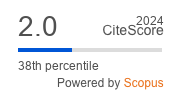Researching the Phenomenon of Poor Ovarian Responders and Management Strategies in IVF: A Narrative Review
DOI:
https://doi.org/10.5644/ama2006-124.379Keywords:
Poor Ovarian Response, Assisted Reproduction Technology, Controlled Ovarian Hyperstimulation, Bologna Criteria, POSEIDON (Patient-Oriented Strategies Encompassing Indivindualized Oocyte Number) ClassificationAbstract
This narrative review aims to summarize all the latest studies published between 2015-2021 concerning the management protocols adopted for poor ovarian response (POR) cases. Patients defined as “poor responders” show minimal response to controlled ovarian hyperstimulation, although there is no standard definition for POR. Although infertility specialists are endeavoring to improve cycle outcomes in poor responders by adopting multiple management strategies, still the estimated risk of cycle cancellation is about 20%. All the studies performed during this study period were evaluated and their results were recorded. The latest published protocols to improve oocyte retrieval in poor responders include: anti-Mϋllerian hormone, clomiphene citrate, co-enzyme Q10, corifollitropin, dehydroepiandrosterone, double stimulation, Follicle Stimulation Hormone, Growth Hormone, Gonadotropin-releasing hormone agonists, letrozole, human chorionic gonadotropin, Luteinizing Hormone, progesterone and testosterone.
Conclusion. Although many strategies have been suggested to manage POR, none has been proven superior to the others. Further large-scale randomized studies are needed to validate experimental techniques leading towards successful individualized treatment regimens.
Downloads
Downloads
Published
How to Cite
Issue
Section
License
Copyright (c) 2022 Dionysios Galatis, Konstantina Kalopita, Ioannis Grypiotis, Ioannis Flessas, Nikolaos Kiriakopoulos, Georgia Micha

This work is licensed under a Creative Commons Attribution-NonCommercial 4.0 International License.





